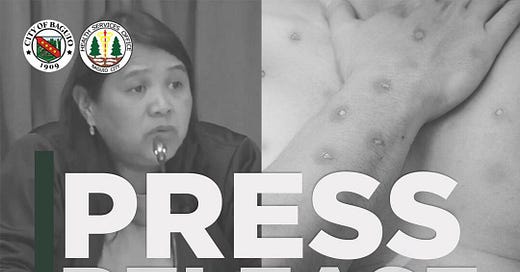Following the recently detected first Mpox case in the city who already completed home isolation last January 17 and recovered, the City Health Services Office (CHSO) surveillance team has detected one new case of Mpox in the city.
The second laboratory-confirmed Mpox case was reported to the DOH on January 18. The case is a 22-year-old male, Baguio resident, with no travel history outside the Philippines but with close contact two weeks before the onset of symptoms. Flu-like symptoms manifested, with body malaise, chills, and fatigue. Distinct rashes on palms, face, arms, thorax, and back area followed.
The case sought consultation at a private hospital, where specimens were collected from the skin lesions and sent to the Research Institute for Tropical Medicine (RITM). PCR test results found the specimens positive for Monkeypox viral DNA. His infection was also caused by the less severe Clade II type, the same as the first Mpox case in the city.
The patient was discharged from the hospital on January 21 and went directly for home isolation. The patient has two identified close contacts who are asymptomatic but were still advised for quarantine until February 6 and the other one on February 24. The Doctors-in-charge are in constant communication with the cases to check on their overall health.
Mayor Benjamin Magalong and City Health Officer Dr. Celia Flor Brillantes assure the public that there is no cause for panic. However, the public is strongly reminded to practice the usual health protocols such as frequent handwashing, wearing of face mask, and physical distancing especially in crowded and enclosed areas. These measures will not only help prevent the spread of Mpox but also other diseases, such as Influenza-like illnesses.
“There is no need for panic. We just have to do frequent hand-washing, use long sleeves or jackets, avoid exposure to crowds as Mpox can be contracted through skin contact or through contaminated things such as bedding, towels, and the like.” Dr. Brillantes expressed.
As both cases were found with history of close intimate contact, the CHSO also emphasized that Mpox can be transmitted through close contact activities such as prolonged exposure, kissing, hugging, and close intimate contact with someone infected. She emphasized to check partners for any symptoms of the disease. "Be faithful, having multiple partners will put you more at risk to Mpox or even other Sexually Transmitted Diseases" she stressed. Exposure through contaminated materials like clothes, utensils, or infected animals may also put you at risk to Mpox.
Common symptoms of Mpox are skin rashes or mucosal lesions, which can last 2–4 weeks. The rashes are accompanied by fever, headache, muscle aches, back pain, low energy, and swollen lymph nodes. Residents are again advised to visit their nearest District Health Center for a medical check-up should fever with skin rashes and other symptoms be observed. Business owners are also advised to wear masks and gloves when handling food and beddings and regularly sanitize frequently touched surfaces.
With the upcoming large gatherings and celebrations in the city, the City Health Officer reiterates that there is no cause for alarm as the virus is not as transmissible as the COVID-19 virus, but still calls on the observation of precautionary measures to prevent the spread and transmission.
According to the Department of Health, a total of 52 Mpox cases have been recorded in different parts of the country as of December 2024.





